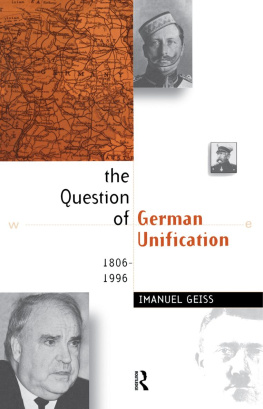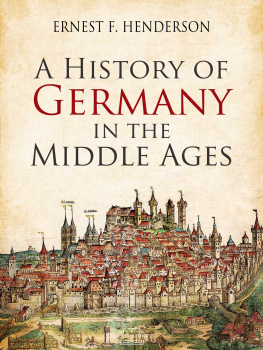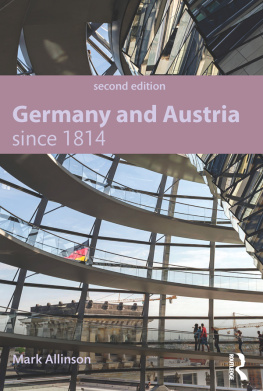A CONCISE HISTORY OF GERMANY
This third edition of Mary Fulbrooks much-admired and popular introduction to German history provides a clear and informative guide to the twists and turns of the story of the German lands and peoples from the early middle ages to the present day. Crisply synthesising a vast array of historical material, Fulbrook explores the interrelationships between social, political and cultural factors in the light of scholarly controversies. Since the second edition in 2004, there have been important changes in Germany, Europe and the wider world. This new edition features a significantly expanded chapter on Germany since 1990, encapsulating recent and dramatic developments that have transformed Germanys character and international standing. This single-volume history of Germany offers broad and accessible coverage and provides a useful guide for students, general readers, travellers to Germany and anyone with an interest in German history.
Mary Fulbrook is Professor of German History at University College London. Over her career, she has authored or edited twenty-five books, including Reckonings: Legacies of Nazi Persecution and the Quest for Justice (2018), the Fraenkel Prize-winning A Small Town near Auschwitz: Ordinary Nazis and the Holocaust (2012) and Dissonant Lives: Generations and Violence through the German Dictatorships (2011; two-volume paperback edn, 2017). Mary Fulbrook was Founding Joint Editor of German History and has served as Chair of the Modern History Section of the British Academy as well as Chair of the German History Society.
Cambridge Concise Histories
This is a series of illustrated concise histories of selected individual countries, intended both as university and college textbooks and as general historical introductions for general readers, travellers and members of the business community.
A full list of titles in the series can be found at: www.cambridge.org/concisehistories
A CONCISE HISTORY OF GERMANY
THIRD EDITION
MARY FULBROOK
University College London
University Printing House, Cambridge CB 2 8BS , United Kingdom
One Liberty Plaza, 20th Floor, New York, NY 10006, USA
477 Williamstown Road, Port Melbourne, VIC 3207, Australia
314321, 3rd Floor, Plot 3, Splendor Forum, Jasola District Centre, New Delhi 110025, India
79 Anson Road, #0604/06, Singapore 079906
Cambridge University Press is part of the University of Cambridge.
It furthers the Universitys mission by disseminating knowledge in the pursuit of education, learning, and research at the highest international levels of excellence.
www.cambridge.org
Information on this title: www.cambridge.org/9781108418379
DOI: 10.1017/9781108289900
Mary Fulbrook 2019
This publication is in copyright. Subject to statutory exception and to the provisions of relevant collective licensing agreements, no reproduction of any part may take place without the written permission of Cambridge University Press.
First published 1991
Reprinted eight times
Second edition 2004
20th printing 2018
Third edition 2019
Printed in the United Kingdom by TJ International Ltd. Padstow, Cornwall
A catalogue record for this publication is available from the British Library.
ISBN 978-1-108-41837-9 Hardback
ISBN 978-1-108-40708-3 Paperback
Cambridge University Press has no responsibility for the persistence or accuracy of URLs for external or third-party internet websites referred to in this publication
and does not guarantee that any content on such websites is, or will remain, accurate or appropriate.
Contents
Illustrations
PLATES
MAPS
Preface
A book such as this is infinitely easier to criticise than to write. The attempt to compress over a thousand years of highly complex history into a brief volume will inevitably provoke squeals of protest from countless specialists, who see their own particular patches distorted, constrained, misrepresented, even ignored. Yet a brief history of such a large topic can make no attempt at comprehensiveness. At best it can provide an intelligent guide to the broad sweep of developments.
These limitations are indeed partly inherent in the nature of historical writing, which cannot be a simple matter of recounting an agreed narrative, but rather must be a process of imposing an order on the mass of material and on the interpretations of that material which comes to us from the past. But it is particularly the case for a concise history of Germany that some brutal decisions about selection and omission have had to be made. While readers will all have their own views on the matter, the author has had to make particular choices. In terms of space devoted to different periods, the book operates on the landscape principle: things nearer to the observer loom larger, are perceived in closer detail, than the mistier general views of the distant horizons. Thus chapters generally deal with progressively shorter periods of time as the present is neared. Within the general landscape surveyed some features appear more important than others. The problem of teleology is well known to historians: there is a tendency to notice particularly features pointing towards the present, explaining developments partly in terms of their consequences (whether or not participants were aware of their contributions to historical progress), and to ignore turnings that led nowhere. While there has been a healthy reaction against this in recent historical writing, it is still the case that certain developments appear more important from the point of view of current concerns than do others. And all authors inevitably have their own particular interests, enthusiasms and blind spots, however hard they try to be balanced and objective in coverage. There is also the particular problem, in relation to the history of Germany, of the limits of what is held to be its proper subject matter. In this volume the history of Austria has had to be considered only insofar as it was an integral part of Germany at different times, or interrelated with the history of modern Germany since 1871. Austria, while perhaps the most obvious, is not the only area to suffer in this way: the boundaries of Germany have been extremely changeable over the centuries.
A wide-ranging work such as this must rely heavily on researches undertaken by others, and represent a synthesis of existing knowledge and often quite conflicting views, while yet developing a coherent overall account. The author is painfully aware of gaps and inadequacies in the present analysis, but hopes at least that in presenting a broad framework which spans the centuries two useful purposes will have been accomplished. This book may present a basis and stimulus for subsequent more detailed exploration of particular aspects; it may also serve to locate existing knowledge and interests of readers within a wider interpretive framework. The book is intended as a form of large-scale map which can be used as a context for finer investigation of details along the way.
I am tremendously grateful to my colleagues and friends who have read and made valuable comments on parts of the manuscript, saving me from factual errors and inappropriate interpretations. I would like in particular to thank the following for their painstaking efforts to improve the text: David Blackbourn; Ian Kershaw; Timothy McFarland; Rudolf Muhs; Hamish Scott; Bob Scribner; Jill Stephenson; Martin Swales. Obviously, I alone am responsible for the inadequacies which remain. The work benefited from a small grant from the UCL Deans Fund enabling me to spend some time combing libraries, museums and archives for suitable illustrative material. The choice of appropriate illustrations was almost as difficult as the construction of the text, and raised as many problems of selection, interpretation and omission. Discerning readers will notice that illustrations of personalities and familiar sights have generally been demoted in favour of representation of broader themes and more remote periods or places. Finally, I would also like to thank my husband and my three children for being willing to spend innumerable summers wandering around central Europe in search of aspects of the German past.
Next page











